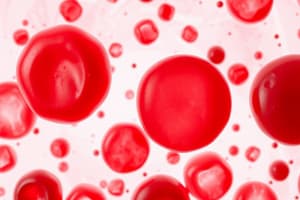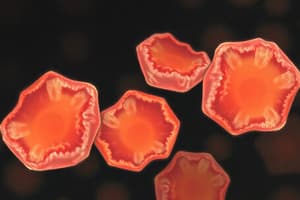Podcast
Questions and Answers
Which statement about blood vessels is correct?
Which statement about blood vessels is correct?
- The aorta carries deoxygenated blood to the lungs.
- The pulmonary artery is an exception to the rule of arteries. (correct)
- All veins carry oxygenated blood.
- All arteries carry deoxygenated blood.
What component in the blood is responsible for clumping when mixed with the wrong antigen?
What component in the blood is responsible for clumping when mixed with the wrong antigen?
- Antibodies (correct)
- Red blood cells
- White blood cells
- Plasma proteins
Which blood circuit is responsible for gas exchange?
Which blood circuit is responsible for gas exchange?
- Systemic circuit
- Coronary circuit
- Pulmonary circuit (correct)
- Capillary circuit
Which of the following structures reduces friction in the cardiovascular system?
Which of the following structures reduces friction in the cardiovascular system?
Which vessel is responsible for bringing deoxygenated blood back to the heart?
Which vessel is responsible for bringing deoxygenated blood back to the heart?
What role does the tricuspid valve play in the heart?
What role does the tricuspid valve play in the heart?
Which of the following arteries branches off the aortic arch?
Which of the following arteries branches off the aortic arch?
What type of blood does the left common carotid artery carry?
What type of blood does the left common carotid artery carry?
Study Notes
Blood Types
- Blood type is determined by the presence or absence of specific antigens on red blood cells
- Antigens are substances that stimulate an immune response in the body
- Antibodies are proteins found in plasma that bind to antigens and trigger an immune response
- Clumping occurs when an antibody meets its corresponding antigen
- Blood type A has A antigens and anti-B antibodies
- Blood type B has B antigens and anti-A antibodies
- Blood type AB has both A and B antigens and no antibodies
- Blood type O has no antigens and both anti-A and anti-B antibodies
- Type O blood is the universal donor
- Type AB blood is the universal receiver
Rhesus Factor
- Rhesus factor is a protein found on the surface of red blood cells
- It is either present (positive, Rh+) or absent (negative, Rh-)
- The Rh factor is important during pregnancy
- Rh-negative mothers can develop antibodies against Rh-positive babies
- Rh incompatibility can cause complications for the baby
- Rh-positive blood can be given to Rh-negative individuals
- Rh-negative blood can only be given to Rh-negative individuals
Cardiovascular System
- Arteries carry oxygenated blood away from the heart except the pulmonary artery
- Veins carry deoxygenated blood to the heart except the pulmonary vein
- Pulmonary circuit carries deoxygenated blood from the heart to the lungs and back
- Systemic circuit carries oxygenated blood from the heart to the rest of the body and back
- Heart has four chambers: right and left atrium, right and left ventricle
- Right atrium receives deoxygenated blood from the body
- Right ventricle pumps deoxygenated blood to the lungs
- Left atrium receives oxygenated blood from the lungs
- Left ventricle pumps oxygenated blood to the body
- Tricuspid valve separates the right atrium and ventricle
- Bicuspid (mitral) valve separates the left atrium and ventricle
- Semilunar valves control blood flow from the ventricles to the arteries
Blood Vessels
- Arteries are thick-walled vessels that carry blood away from the heart
- Veins are thin-walled vessels that carry blood to the heart
- Capillaries are the smallest blood vessels that allow exchange of gases and nutrients
- The aorta is the largest artery in the body
- Branches of the aorta include the coronary arteries, carotid arteries, subclavian arteries, and femoral arteries
- Coronary arteries supply blood to the heart
- Carotid arteries supply blood to the head and neck
- Subclavian arteries supply blood to the arms
- Femoral arteries supply blood to the legs
- Deep femoral artery is a branch of the femoral artery and supplies blood to the thigh
Pathway of Blood
- Blood flows from the heart through the arteries, capillaries, and veins, and back to the heart
- Superior vena cava carries deoxygenated blood from the upper body to the heart
- Inferior vena cava carries deoxygenated blood from the lower body to the heart
- Pulmonary artery carries deoxygenated blood from the right ventricle to the lungs
- Pulmonary veins carry oxygenated blood from the lungs to the left atrium
- Aorta carries oxygenated blood from the left ventricle to the rest of the body
Studying That Suits You
Use AI to generate personalized quizzes and flashcards to suit your learning preferences.
Related Documents
Description
Test your knowledge on blood types and the Rhesus factor. This quiz covers the characteristics of various blood types, their antigens and antibodies, and the significance of the Rhesus factor in healthcare, especially during pregnancy. Challenge yourself and learn more about this crucial aspect of human biology.




